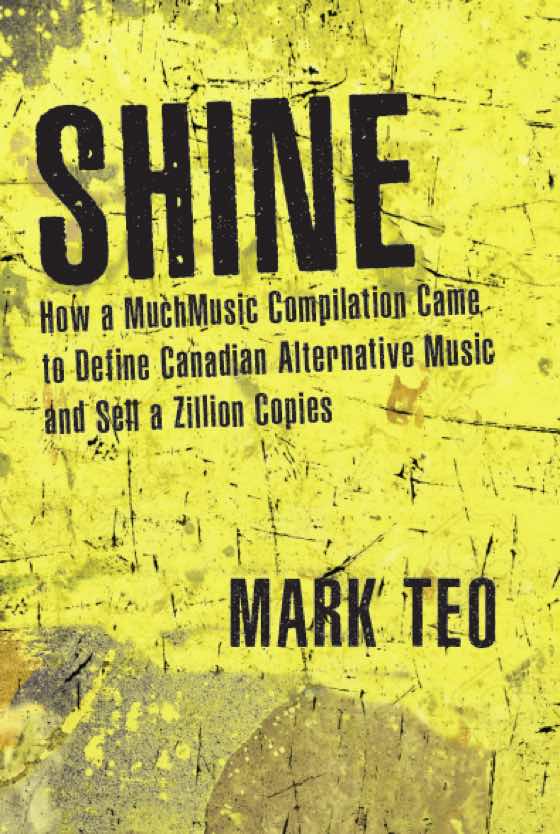When confronted with the existence of a book about Big Shiny Tunes, the first thing most people will ask is obvious: Who would want to read that? It's a fair question — back in the heyday of the CD, compilations were a-dime-a-dozen, a cheap way for labels to entice listeners to pony up to buy their artist's records.
But, as Mark Teo explains in his new book, Shine: How a MuchMusic Compilation Came to Define Canadian Alternative Music and Sell a Zillion Copies, about MuchMusic's annual collection of all that rocked, Big Shiny Tunes was more than just a marketing gimmick; it was a uniquely Canadian cultural phenomenon. In 1997, Big Shiny Tunes 2 sold a million copies in Canada. One in every 30 Canadians owned that CD. That it did so while also regularly sitting homegrown talent like Sloan and Moist next to international superstars like Foo Fighters and Bush only gave credence to the idea that Canada's alt-rock upstarts could go toe-to-toe with their globe-trotting peers.
Not that you'll hear much of that from the people that actually put the damn thing together every year — the folks from Much and the Canadian major labels who put each year's edition together (a different label handled it every year) have little recollection or even much nostalgia for details.
As a result, Teo has some heavy contextualizing to do. He focuses on the comp's inaugural 1996 edition, which fit Can-Rockers like I Mother Earth and Killjoys next to Porno for Pyros and Better Than Ezra among many other mid-'90s alt-rock luminaries and went three-times platinum in Canada (300,000 copies sold). Skipping over still-going concerns like Radiohead and Red Hot Chili Peppers, he cherry-picks the Canadian selections, offering memories and retrospective thoughts on each artist while arguing for their presence on the disc (even Moist, who Teo makes very clear he quite frankly hates, make the grade). He even tracks down members of bands like Pluto and Killjoys, who all attribute varying degrees of their success to their inclusion on the comp.
Kudos to Teo for managing to not only stretch what began as an newspaper article into a book-length analysis of Big Shiny Tunes' impact on Canadian music, but to also make it thoroughly engaging. Yet at just 166 pages, surely there was room for a deeper analysis of the international band sharing space with their Canadian peers. Little is said about those acts, from aforementioned titans like Radiohead to "What song did they sing?" one-hit-wonders like Poe (it was "Angry Jonny"). It's a curious choice, given Teo's argument that the comp contextualized Canadian bands and put them on equal footing with the rest of the alt-rock crowd. The book doesn't even include a tracklist for the comp into which it's taking a deep dive.
Nevertheless, thanks to Teo's deep research and sharp criticism Shine manages to do the near-impossible: it makes you care about a decades-old series of CD compilations, even if you never owned a copy.
(Eternal Cavalier)But, as Mark Teo explains in his new book, Shine: How a MuchMusic Compilation Came to Define Canadian Alternative Music and Sell a Zillion Copies, about MuchMusic's annual collection of all that rocked, Big Shiny Tunes was more than just a marketing gimmick; it was a uniquely Canadian cultural phenomenon. In 1997, Big Shiny Tunes 2 sold a million copies in Canada. One in every 30 Canadians owned that CD. That it did so while also regularly sitting homegrown talent like Sloan and Moist next to international superstars like Foo Fighters and Bush only gave credence to the idea that Canada's alt-rock upstarts could go toe-to-toe with their globe-trotting peers.
Not that you'll hear much of that from the people that actually put the damn thing together every year — the folks from Much and the Canadian major labels who put each year's edition together (a different label handled it every year) have little recollection or even much nostalgia for details.
As a result, Teo has some heavy contextualizing to do. He focuses on the comp's inaugural 1996 edition, which fit Can-Rockers like I Mother Earth and Killjoys next to Porno for Pyros and Better Than Ezra among many other mid-'90s alt-rock luminaries and went three-times platinum in Canada (300,000 copies sold). Skipping over still-going concerns like Radiohead and Red Hot Chili Peppers, he cherry-picks the Canadian selections, offering memories and retrospective thoughts on each artist while arguing for their presence on the disc (even Moist, who Teo makes very clear he quite frankly hates, make the grade). He even tracks down members of bands like Pluto and Killjoys, who all attribute varying degrees of their success to their inclusion on the comp.
Kudos to Teo for managing to not only stretch what began as an newspaper article into a book-length analysis of Big Shiny Tunes' impact on Canadian music, but to also make it thoroughly engaging. Yet at just 166 pages, surely there was room for a deeper analysis of the international band sharing space with their Canadian peers. Little is said about those acts, from aforementioned titans like Radiohead to "What song did they sing?" one-hit-wonders like Poe (it was "Angry Jonny"). It's a curious choice, given Teo's argument that the comp contextualized Canadian bands and put them on equal footing with the rest of the alt-rock crowd. The book doesn't even include a tracklist for the comp into which it's taking a deep dive.
Nevertheless, thanks to Teo's deep research and sharp criticism Shine manages to do the near-impossible: it makes you care about a decades-old series of CD compilations, even if you never owned a copy.




